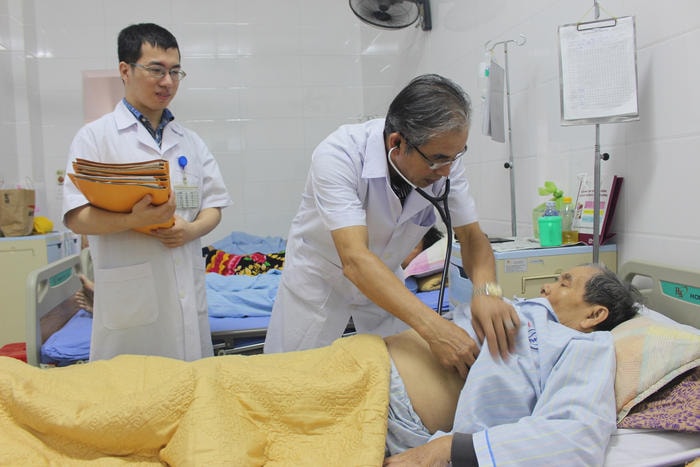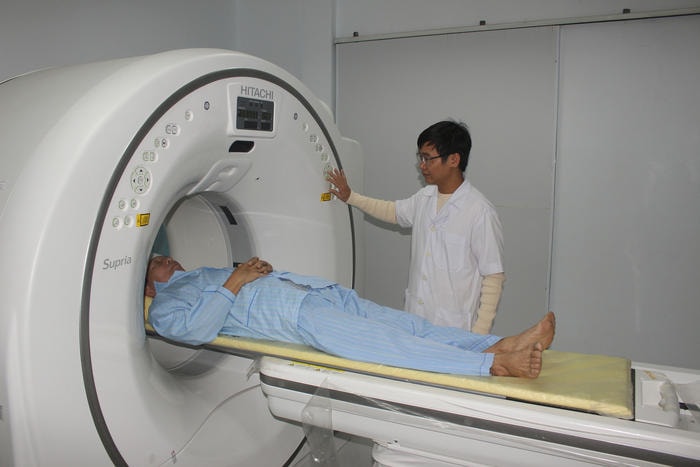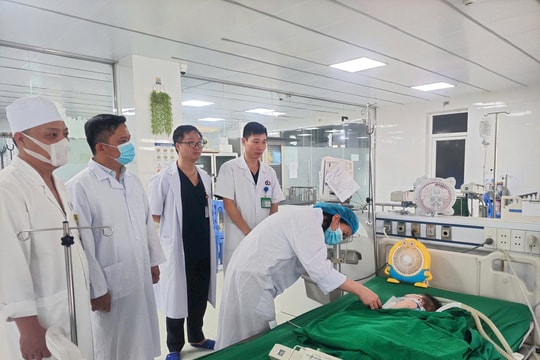Raising public awareness in diabetes prevention
(Baonghean) - Doctor Nguyen Van Hoan - Director of Nghe An Endocrinology Hospital answered an interview with Nghe An newspaper on the occasion of "International Diabetes Day".
Reporter:Sir, could you please tell us the current status and developments of diabetes?
Doctor Nguyen Van Hoan:Type 2 diabetes mellitus (T2DM) is a serious global health problem with high morbidity and mortality rates. It is one of the non-communicable diseases with high risk and rapid growth. In particular, the rate of increase in the disease rate in developing countries has increased by 170% (4 times higher than in developed countries), including Vietnam.
In Vietnam, the results of a national survey by the Central Endocrinology Hospital (2012) showed a rate of 5.7% of the population (with more than 5 million people suffering from the disease). This rate increased more than 2 times compared to 2002 (2.7%).
In Nghe An, according to the investigation results of Nghe An Endocrinology Hospital, the rate of diabetes and pre-diabetes in the whole province has increased every year; from 3% (in 2005), 5.36% (in 2010), to 2015: 7.13% diabetes and 19.1% pre-diabetes. Of these, 60% have not been diagnosed and treated, especially the rate of gestational diabetes and diabetes in children has also increased compared to before.
 |
| The Provincial Endocrinology Hospital promotes preventive activities and improves treatment effectiveness to prevent and control diabetes for patients and the community. Photo: Dinh Nguyet |
Reporter:According to you, why is the rate of people with diabetes increasing?
Doctor Nguyen Van Hoan:Diet, activities, lifestyle, lack of exercise, in addition, some people are subjective about their health status and lack medical knowledge about the disease...; leading to the number of people with diabetes increasing rapidly in recent years.
Reporter:What risks and complications does diabetes cause, sir?
Doctor Nguyen Van Hoan:WHO recommends that diabetes is a "silent killer" because it causes serious complications such as blindness, amputation, kidney failure, stroke, coronary artery disease... According to IDF statistics, in 2015, globally, over 5 million people died from diabetes and diabetes-related diseases. Thus, the number of deaths due to diabetes is much higher than infectious diseases that have always been considered dangerous such as HIV/AIDS, Tuberculosis, Malaria.
Reporter:So, in recent times, how has the Hospital implemented diabetes prevention and control work for patients and the community, sir?
Doctor Nguyen Van Hoan:In order to help people have knowledge of disease prevention and timely detection, the Provincial Endocrinology Hospital has focused on promoting preventive activities. In particular, we pay special attention to training and building a network of programs at grassroots health facilities throughout the province to coordinate and promote propaganda in many forms such as: Through mass media, leaflets, posters, propaganda posters, and consultations have contributed significantly to raising awareness for people to understand and know how to prevent and live safely with this disease.
Regarding treatment, the Endocrinology Hospital has consulted and decentralized treatment to district hospitals, regional clinics, and some health stations. The Endocrinology Hospital only accepts and treats severe cases with many complications, beyond the treatment capacity of the grassroots level. In addition, it focuses on consulting and screening in the community to detect cases early so that timely treatment management plans can be made.
 |
| Endocrinology Hospital invests in modern medical equipment system, improving the effectiveness of medical examination and treatment. Photo: Dinh Nguyet |
Reporter:What is the orientation of Nghe An Endocrinology Hospital regarding the prevention and control of diabetes in the community in the coming time?
Doctor Nguyen Van Hoan:As the unit that performs the last line of the province's tasks of examining and treating specialized endocrine diseases and metabolic disorders, and as a permanent unit of the Provincial Diabetes Prevention Project, the hospital carries out regular activities throughout the year as above. This November, we focus on activities for the communication month on the occasion of "International Diabetes Day November 14".
The theme of launching and responding to the International Diabetes Day with the theme chosen by the World Health Organization (WHO) and the International Diabetes Federation (IDF) is: "Women and diabetes - We have the right to a healthy future". As the permanent unit of the project, the Endocrinology Hospital will advise the Director of the Department of Health, and directly implement communication activities, consultation, screening, treatment... in a comprehensive manner.
The launching ceremony will take place on November 12, Dr. Duong Dinh Chinh - Acting Director of Nghe An Department of Health will deploy and launch, medical units, political organizations and society in the whole province will participate and respond. Within the framework of the program, there will be a scientific conference on Diabetes, with the participation of Prof. Dr. Thai Hong Quang, President of the Vietnam Endocrine - Diabetes Association; Prof. Dr. Nguyen Hai Thuy - Vice President of the Vietnam Endocrine - Diabetes Association; Prof. Dr. Nguyen Lan Viet - President of the Vietnam Cardiovascular Association and a number of leading experts in Endocrine - Cardiovascular diseases in Vietnam.
Reporter:Could you tell us why this year WHO and IDF chose the theme for "International Diabetes Day" as "Women and diabetes - We have the right to a healthy future"?
Doctor Nguyen Van Hoan:According to the IDF, by 2015, more than 199 million women worldwide had diabetes, which is expected to increase to 313 million by 2040. Of these, 2/5 women with diabetes are of childbearing age, accounting for more than 60 million women worldwide. Diabetes is the 9th leading cause of death in women globally, causing 2.1 million deaths each year. Women with type 2 diabetes are nearly 10 times more likely to develop coronary heart disease than women without the condition. Women with type 1 diabetes are at risk of early miscarriage or having children born with birth defects if the pregnancy is not well managed.
One in seven babies is born to mothers with gestational diabetes. About half (50%) of women with a history of gestational diabetes will develop type 2 diabetes within 5 to 10 years after giving birth.
Therefore, pregnant women need to have regular health check-ups and blood sugar tests at specialized medical facilities to get advice on disease prevention, especially during the 24-28 week of pregnancy, they need to have a blood sugar test to confirm the diagnosis.
Reporter:Thank you for this conversation!
Dinh Nguyet(Perform)
| RELATED NEWS |
|---|








